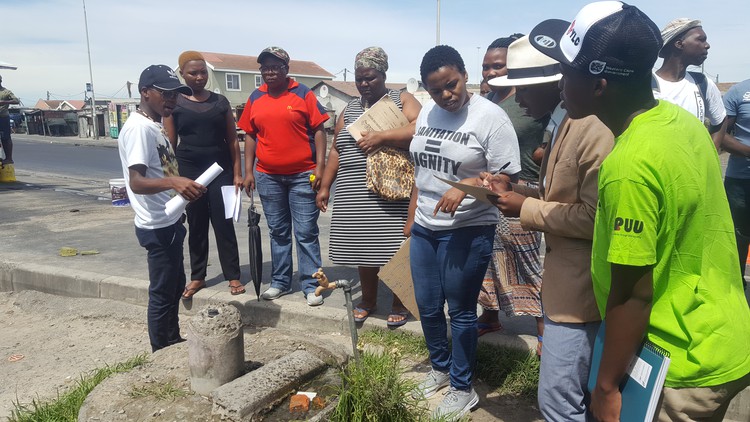No water, no business, say Khayelitsha businesses
SJC conducts water audit in informal settlements
“No water, no business,” says Khayelitsha hair salon owner Sinalo.
Sinalo, who did not want to give her full name, gets water for her salon from a nearby standpipe.
“I hear about this Day Zero and the only thing I can say is: no water, no business. Even when we used to have water cuts, I would close the salon, because when the water comes back, it comes back dirty and I cannot use it.”
Sinalo was responding to questions by members of the Social Justice Coalition (SJC) which is conducting a social audit of the use of water in parts of Khayelitsha. The audit, launched on Monday, aims to cover SST informal settlement, Greenpoint, Makhaza, BM Section, RR Section, BT Section and Monwabisi Park. It will run until 20 February.
When the SJC arrived, Sinalo had two customers, a young girl who was getting her hair plaited, and a woman who was taking out her cornrows. At the corner of her small shack salon was a blue drum with a few litres of water.
Asked how much water she used, Sinalo said she could not say. “It depends on my clients.”
The audit will focus on standpipes, drains and toilets in informal settlements, and the problems that residents face when there are leaks, blockages and breakages.
SJC’s Musa Gweba said there were reports of water being turned off in areas, people using seawater, and massive hoarding when the water comes back on. She said the aim of the audit was to collect as much data as possible which the SJC would then put together and see how the problems can be dealt with.
At a standpipe in Japhta Masemola Road, SST, residents complained there was no drainage.
“You have to walk quite a distance when you want to dump your dirty water because the drain from the tap is quite far,” said resident Vivian Nkankula.
Nkankula does not live far from the standpipe she shares with about 30 residents, but she dares not walk to the standpipe at night. “I make numerous trips a day to this tap. We have been lucky that our water has never been switched off and if the standpipe breaks, we fix it ourselves.”
Asked what she thought about the water crisis, Nkankula said she did not know much about it. She had heard that water was scarce and that sea water might be used to help save the situation.
Mama Mjanyelwa has been selling meat since 1981. She also said she would have to close her business if the water was cut off. She does not believe that will happen. The water crisis talk was just “threats”, she told GroundUp. She did not believe that Day Zero would happen.
The SJC is one of several civic organisations which came together last week to discuss responses to the water crisis. Others include Equal Education, the World Wildlife Fund, Doctors Without Borders, the Treatment Action Campaign and Unite Behind.
Unite Behind’s Phumeza Mlungwana said the organisations planned to engage with government and to educate communities. “The goal is to put together a plan for our various communities and organisations,” said Mlungwana.
Support independent journalism
Donate using Payfast

Next: Post office to phase in payment of social grants from 1 April
Previous: Court finds municipality corrupt
© 2018 GroundUp. 
This article is licensed under a Creative Commons Attribution-NoDerivatives 4.0 International License.
You may republish this article, so long as you credit the authors and GroundUp, and do not change the text. Please include a link back to the original article.

